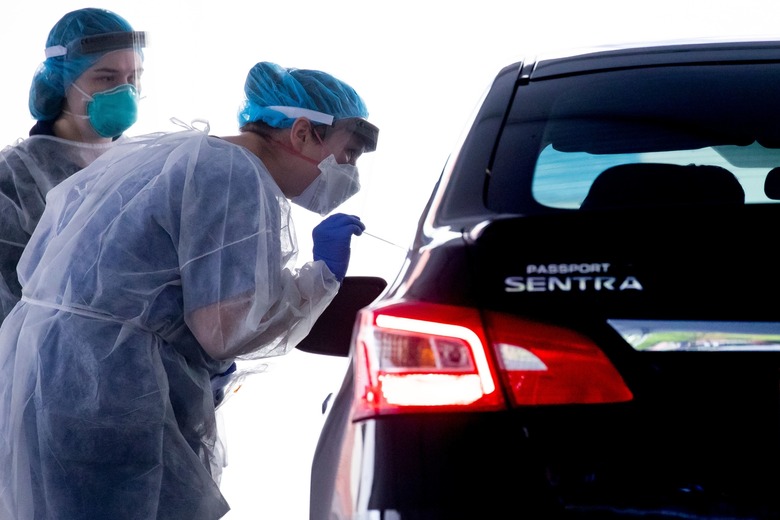Here's How Long Coronavirus Patients Are Contagious, According To Multple Studies
- The coronavirus recovery time might not coincide with the period a COVID-19 patient is still contagious, a new study indicates.
- Researchers from Singapore say a patient isn't infectious 11 days after the onset of symptoms, citing similar research from other countries.
- The findings could change COVID-19 case management policies for patients who keep testing positive for several weeks after the onset of symptoms, and for patients who are treating themselves at home.
Containing the novel coronavirus is essential for reopening economies, and it's only possible with good testing and contact tracing policies that can reduce the rate of infection. Knowing how long a person is infectious is also a key detail for authorities, as they can better manage their resources and caseload. New data from Singapore indicates that a COVID-19 patient is no longer contagious after 11 days, even if his or her PCR tests still return positive results.
A new study from Singapore's National Centre for Infectious Diseases and the Academy of Medicine says that the virus could not be isolated or cultured after day 11 of illness. The researchers analyzed parameters from 73 COVID-19 patients in the region, concluding that "viral RNA detection may persist in some patients, such persistent RNA detection represent non-viable virus and such patients are non-infectious."
The new respiratory disease is quite unusual when it comes to recovery. Some people need several weeks to get better and many people keep testing positive even after the symptoms go away, making a discharge impossible. These new studies might change the way hospitals manage COVID-19 patients.
The study references similar studies from other countries, including research from Hong Kong that showed an infected person could be contagious as early as 2.3 days before the onset of symptoms, peaking just before the onset of symptoms and declining within 7 days. A different study from Taiwan that looked at COVID-19 patients and contact concluded that the secondary cases they observed originated from contact with an infected patient within 5 days of that person's onset of symptoms. None of the contacts were infected after that.
The Singaporean paper also references a study from Germany that supports its findings, research we highlighted back in early April. The German researchers found that patients were highly infectious in the first week of symptoms. "Infectious virus was cultured from throat and lung specimens in the first week of symptoms, but none after day 8 in spite of high viral loads detected by regular PCR," the researchers note.
The Singapore study seems to contradict a study from China from late March, which suggested that COVID-19 patients might be contagious even after the symptoms disappear. That study said the average duration of symptoms was 8 days, but the patients tested positive for 8 days after the symptoms were gone. However, what the Singapore study says is that patients will not be infectious 11 days after the onset of symptoms, even if they still test positive. That's actually in line with the study from China. Patients could be infectious even after COVID-19 symptoms disappear, but not beyond 11 days.
Active viral replication drops quickly after the first week, and viable virus was not found after the second week of illness despite the persistence of PCR detection of RNA. These findings are supported by epidemiologic, microbiologic and clinical data. These new findings allow for revised discharge criteria based on the data on the time course of infectiousness rather than the absence of RNA detection by PCR testing, taking into consideration both the clinical and public health perspectives, including the individual patient's physical and mental well-being. In addition, given these findings, resources can focus on testing persons with acute respiratory symptoms and suspected COVID-19 in early presentation, allowing timelier public health intervention and containment.
The data could change the way hospitals implement discharge policies and it could be used to develop updated protocols for people who are treating the disease at home in isolation.
The research also indicates that COVID-19 cases that test positive aren't always infectious. The paper mentions research from Korea on the matter. The Korean CDC authority gave us the kind of good news about COVID-19 immunity we've been waiting for a few days ago. People who test positive again days for weeks after recovering have not been infected again with the novel coronavirus. It's not relapse or a sign of no immunity. Instead, the tests can pick up residual viral material that's not infectious. Korea actually changed its policies for such cases. Those who test positive again will not be quarantined, but health authorities will keep monitoring their contacts.
What the study doesn't address is the infectiousness of asymptomatic and presymptomatic individuals. It's also unknown how contagious asymptomatic people are. But the report says that asymptomatic patients may have similar viral shedding patterns.
